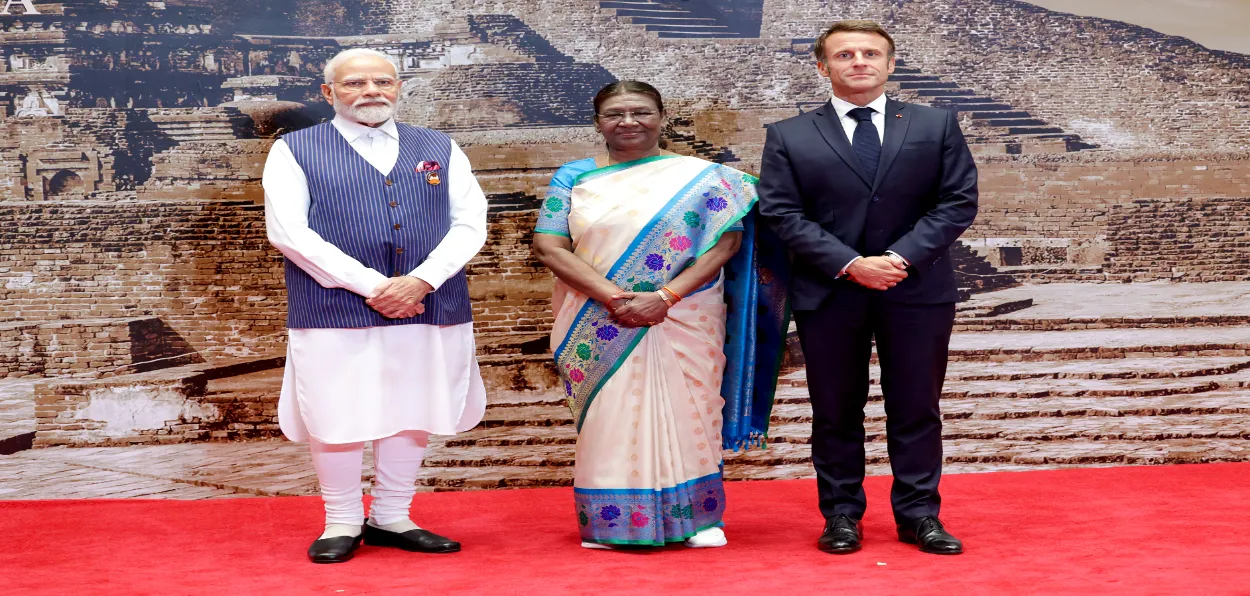
 Pallab Bhattacharyya
Pallab Bhattacharyya
The narrative of India-France relations stretches across two millennia, woven with threads of exploration, trade, conflict, and cultural exchange. While direct contact in the first century AD remains shrouded in whispers, echoes of India's riches resonated through Greek and Roman accounts, igniting a spirit of discovery in European hearts.
Fast forward to the 17th century, and French colonial ambitions found fertile ground in India. Pondicherry, a thriving port city, became a jewel in the French crown, nurturing vibrant cultural encounters. François Bernier, a 17th-century French physician and philosopher, documented his experiences in Mughal India, offering rare insights into the social and political landscape of the time.
His association with the Mughal emperors began with his meeting with Prince Dara Shikoh at Deora when he was returning from Surat to Agra. Dara Sikoh had lost his claim to the Kingdom in the war with his brother Aurangzeb. At that time, Dara was in search of a physician for his wife. Bernier alleviated the princess’s pain and in return, Dara Shikoh appointed Bernier as his private physician. Later when Dara Shikoh fled his empire as one of his servants betrayed him Bernier found shelter with Daneshmand Khan, a Mughal nobleman, who took him to Aurangzeb’s court.
During an inspection tour by Aurangzeb, Bernier described Kashmir to the emperor. He had returned from Kashmir and was now at the other end of the empire in Bengal. He returned to Surat in 1668 and wrote a memoir on Indian commerce.
Bernier served Aurangzeb for 12 years. He witnessed the political intrigues, strategies, methods of warfare, and the war of succession among the four sons of Shah Jahan. He also understood the social and economic aspects of the empire, its geographical and strategic extent up and close.
He wrote letters to his fellow Frenchmen back home in which he gave details of the economic conditions and religious beliefs of the Hindus (referred to as Gentiles), the socio-cultural as well as the religious practices followed by the people, particularly of the northern part of the empire. He also gave vivid pictures of the capital cities of Delhi and Agra. All these comprise the literature about his stay in India.
India's fight for independence, however, cast a shadow on the relationship. The Sepoy Mutiny of 1857 saw the French initially take a neutral stance, and later stand with the British. Despite these tensions, intellectual curiosity persisted. French thinkers like Romain Rolland championed India's cause, highlighting the injustices of colonialism and advocating for self-determination.
After India’s independence in 1947, a new chapter in bilateral relations unfolded. France became a strong advocate of India's developmental aspirations, supporting key sectors like nuclear energy and space technology. The 1998 declaration of a strategic partnership cemented this bond, paving the way for extensive collaboration in defense, counter-terrorism, and international security.
Today, the India-France relationship stands as a testament to the transformative power of shared values and a commitment to a multipolar world. The two nations work together on the global stage, advocating for climate action, sustainable development, and the rules-based international order.
A vibrant cultural tapestry binds the two nations beyond the realm of politics. Film festivals, art exhibitions, and academic exchanges nourish an enduring mutual appreciation for each other's artistic expressions. Bollywood films captivate Parisian audiences, while French cinema mesmerizes Indian viewers. Culinary influences crisscross borders, with French croissants gracing Indian tables and Indian spices enhancing French gastronomy.
The Horizon 2047 Roadmap is a joint strategic vision document signed by India and France in 2018. It outlines a comprehensive framework for deepening cooperation between the two nations across various sectors over the next 25 years, with a focus on the year 2047, which marks the centenary of India's independence. The highlights of this roadmap are
Political and Security Cooperation: Strengthening strategic dialogue on regional and global security issues, promoting maritime cooperation, and collaborating in counter-terrorism efforts.
Boosting bilateral trade and investment, fostering technological innovation, and collaborating in areas like infrastructure development, renewable energy, and space technology.
Cultural and Educational Cooperation: Promoting cultural exchanges, enhancing academic collaborations, and fostering cooperation in areas like science, technology, and research.
The India-France relationship stands as a testament to the power of shared values and a commitment to a multipolar world. As both nations look towards the future, their partnership holds immense promise for shaping a more peaceful, prosperous, and sustainable world. The French President Emmanuel Macron is the chief guest at India's 75th Republic Day celebrations.
ALSO READ: At 75, India is ready to tackle surmounting internal, external security threats
What PM Narendra Modi said during his visit to France in August 2019 succinctly describes the upbeat mood in both countries: “Today in the 21st century we talk of INFRA. I would like to say that for me it is IN+FRA, which means the alliance between India and France.”
The author is a former DGP of Assam and former Chairman of APSC
